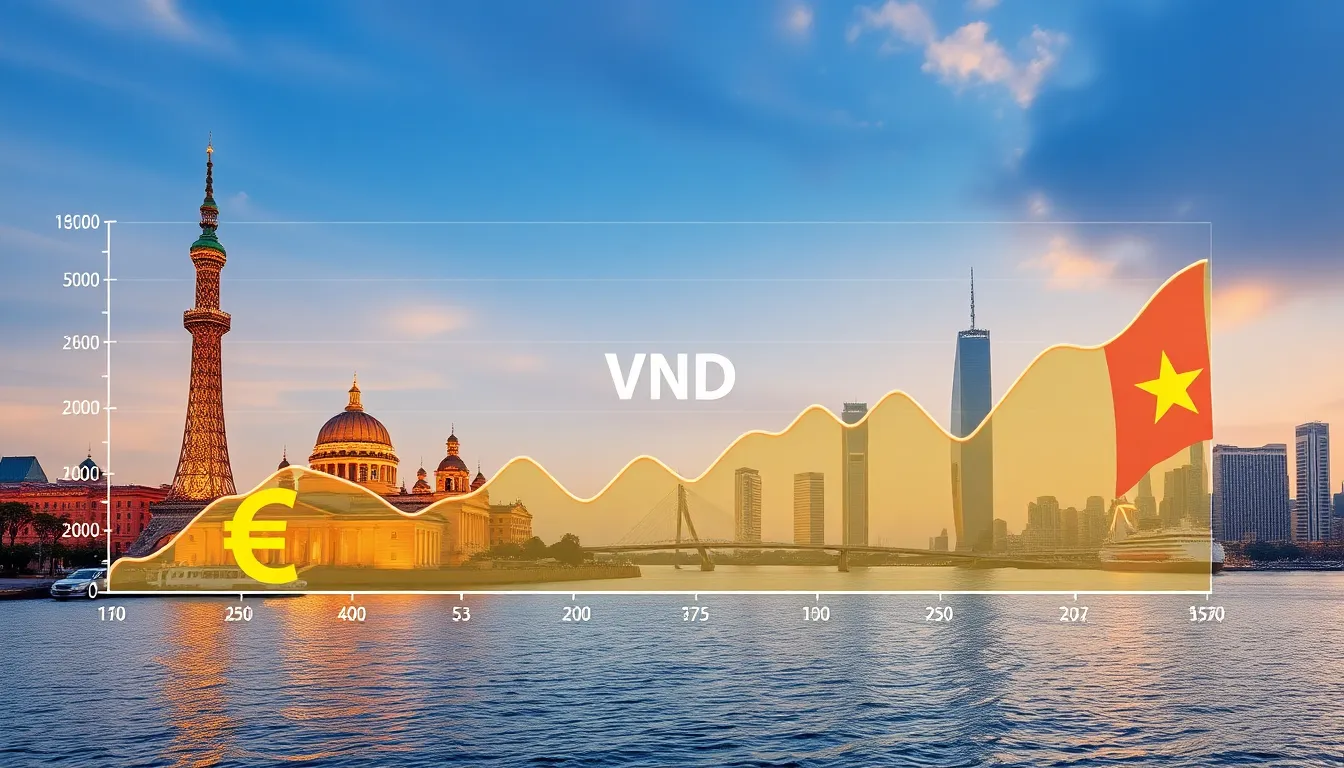Table of Contents
ToggleNavigating the world of currency exchange can be a daunting task, especially when dealing with dynamic rates like the EUR to VND exchange rate. With economic factors constantly shifting, understanding how these fluctuations impact travelers, businesses, and investors is crucial.
As the Euro and Vietnamese Dong interact in the global market, they reflect broader economic trends and geopolitical developments. Whether planning a trip to Vietnam or considering investment opportunities, knowing the current exchange rate helps make informed decisions. This article dives into the intricacies of the EUR to VND exchange rate, exploring its trends, factors influencing its movement, and tips for maximizing currency conversion.
Overview of EUR to VND Exchange Rate
The EUR to VND exchange rate reflects the value of the Euro against the Vietnamese Dong. This rate fluctuates due to several factors, including economic indicators, central bank policies, and geopolitical events.
The current exchange rate impacts travelers, businesses, and investors. For travelers, knowing the exchange rate helps in budgeting for expenses in Vietnam. Businesses rely on the rate for pricing, invoicing, and managing costs in Vietnam. Investors track the exchange rate for potential returns on investment.
Economic indicators like inflation, trade balance, and GDP growth in both the Eurozone and Vietnam significantly influence the EUR to VND exchange rate. Central banks, such as the European Central Bank and the State Bank of Vietnam, implement monetary policies affecting currency value. Geopolitical developments, including trade agreements and diplomatic relations, also play a crucial role.
Historical trends show the EUR to VND exchange rate has undergone significant changes. An analysis of past rates can help in understanding potential future movements. Recent data indicates a general appreciation of the Euro against the Vietnamese Dong over the last few years, although volatility remains a factor.
Current Exchange Rate
| Date | EUR to VND Rate |
|---|---|
| March 1, 2023 | 25,500 |
| March 15, 2023 | 25,600 |
| March 30, 2023 | 25,450 |
| April 1, 2023 | 25,700 |
Monitoring these changes aids in making informed decisions regarding currency conversion. Conducting thorough analysis and using reliable sources offers insights into future exchange rate trends.
Factors Influencing EUR to VND Exchange Rate

Understanding the factors that influence the EUR to VND exchange rate helps individuals and businesses navigate currency fluctuations effectively. Key elements include economic conditions and political stability.
Economic Conditions
Economic conditions significantly affect the EUR to VND exchange rate. Various indicators, such as inflation rates, unemployment levels, and GDP growth in both the Eurozone and Vietnam, play crucial roles. For instance, lower inflation in the Eurozone compared to Vietnam often strengthens the Euro against the Dong. Trade balance also matters; a trade surplus in the Eurozone typically supports Euro appreciation while a deficit can weaken it. Moreover, interest rates set by central banks drive investor sentiment. Higher rates in the Eurozone can attract foreign capital, boosting the Euro’s value.
Political Stability
Political stability is essential for maintaining confidence in a currency. A stable political environment in the Eurozone fosters a stronger Euro, as investors prefer to allocate funds in secure markets. Uncertainties, such as elections or government policies, can trigger volatility, affecting the EUR to VND exchange rate. Conversely, any signs of instability in Vietnam can lead to depreciation of the Dong, as investors might seek safer assets. Therefore, monitoring political developments in both regions is vital for predicting exchange rate movements.
Historical Trends in EUR to VND Exchange Rate
The EUR to VND exchange rate showcases significant fluctuations influenced by economic indicators and geopolitical events. Understanding these trends is essential for travelers, businesses, and investors looking to navigate the currency market effectively.
Recent Developments
Recent data from 2023 indicates a general appreciation of the Euro against the Vietnamese Dong. As of March 2023, the exchange rate hovered around 24,000 VND per Euro, which reflects continued strengthening compared to previous years. Factors such as improved economic performance in the Eurozone and fluctuating inflation rates in Vietnam contributed to this trend. Additionally, geopolitical stability in Europe, coupled with strategic monetary policies from the European Central Bank, reinforced the Euro’s position, prompting market analysts to anticipate sustained momentum in the near term.
Long-Term Trends
Long-term trends in the EUR to VND exchange rate reveal gradual appreciation of the Euro over the past decade. Historical data shows that in 2012, 1 Euro equated to approximately 25,000 VND, with fluctuations resulting from varying inflation rates and foreign exchange policies. Economic expansions in the Eurozone since 2016 led to stronger purchasing power for the Euro, with the exchange rate stabilizing between 23,000 VND and 24,000 VND from 2019 onward. In contrast, economic challenges in Vietnam, including trade deficits and inflation spikes, have placed downward pressure on the Dong. As these trends evolve, monitoring long-term patterns remains crucial for making informed currency decisions.
Analysis of Current EUR to VND Exchange Rate
The current EUR to VND exchange rate reflects the ongoing economic landscape in both the Eurozone and Vietnam. As of April 2023, the rate stands around 24,000 VND per Euro, highlighting a trend of Euro appreciation against the Dong. This situation arises from various economic indicators that underscore growth and stability in the Eurozone compared to fluctuations in Vietnam’s economy.
Economic Indicators
- Inflation rates: Lower inflation in the Eurozone strengthens the Euro against the Dong, enhancing purchasing power.
- Trade balance: A positive trade balance in the Eurozone supports Euro strength, while deficits in Vietnam can exert downward pressure on the Dong.
- GDP growth: Robust GDP growth in the Eurozone fosters confidence in the Euro, while economic slowdowns in Vietnam may lead to a weaker Dong.
Central Bank Policies
- European Central Bank: Monetary policies from the European Central Bank significantly influence the EUR to VND exchange rate. Interest rate hikes typically bolster the Euro.
- State Bank of Vietnam: Policies that aim to stabilize or adjust the Dong can affect its value relative to the Euro.
Geopolitical Developments
- Political stability: A stable political environment in the Eurozone supports a stronger Euro, while uncertainties in Vietnam can lead to exchange rate volatility.
- Trade relations: Changes in trade agreements and foreign investment can impact the EUR to VND exchange rate. Strengthened trade relations for the Eurozone often lead to increased currency strength.
Historical Context
Recent data illustrates that the Euro has gradually appreciated against the Dong, with notable rates recorded over the past decade. For instance, in 2012, 1 Euro was equivalent to approximately 25,000 VND. The ongoing economic recovery and improvement in Eurozone metrics show promise for continued Euro strength against the Dong.
Tracking these economic indicators and geopolitical factors is essential for travelers, businesses, and investors. Awareness of the current and historical trends involves utilizing reliable data sources for currency conversion decisions.
Future Forecasts for EUR to VND Exchange Rate
Forecasts for the EUR to VND exchange rate depend on various economic and geopolitical conditions. Analysts project that key indicators such as inflation rates, GDP growth, and trade balances will continue influencing the rate. Economists expect inflation in the Eurozone to remain relatively stable, which may support the Euro’s strength against the Vietnamese Dong.
Economic growth in both regions presents a mixed outlook. If the Eurozone sustains its recovery, the Euro could appreciate further against the Dong. Conversely, any economic setbacks in Vietnam, such as increased inflation or trade deficits, might depreciate the Dong.
Central bank policies play a crucial role in short-term fluctuations. The European Central Bank’s interest rate adjustments can strengthen the Euro, while the State Bank of Vietnam’s measures can impact the Dong’s value. If the European Central Bank raises rates, this action would likely enhance the Euro’s appeal to investors, contributing to further gains against the VND.
Geopolitical stability also significantly affects exchange rates. Any events like trade agreements or political unrest in either region can induce volatility. Analysts recommend monitoring these developments closely for accurate forecasts. Ongoing assessments of current conditions suggest that maintaining awareness of trends is vital for travelers and investors dealing with EUR and VND exchanges.
Recent projections indicate that the EUR to VND exchange rate could stabilize around 24,500 VND per Euro in the next quarter if positive economic trends continue. Should any adverse developments occur, investors might witness a different scenario. Regularly reviewing updated economic reports can aid in understanding potential shifts in the EUR to VND exchange rate.
Understanding the EUR to VND exchange rate is crucial for anyone engaged in travel, business, or investment. The interplay of economic indicators and geopolitical factors shapes this rate, influencing financial decisions and budgeting. As trends indicate a general appreciation of the Euro against the Dong, remaining informed about economic developments is essential.
By tracking inflation rates, trade balances, and central bank policies, individuals can better navigate currency conversion. Awareness of historical trends and current data provides a solid foundation for making informed choices. As the economic landscape evolves, staying updated will help predict future movements in the EUR to VND exchange rate, ensuring optimal outcomes for all stakeholders.





